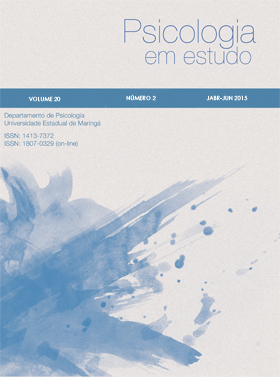Processos de Resiliência em Migrantes: Narrativas Biográficas de Brasileiros em Portugal
Abstract
Os estudos sobre as migrações têm focado as dificuldades, as barreiras e obstáculos na chegada e permanência no país de acolhimento. Reconhecendo a existência destes processos adversos, poucos estudos se têm dedicado ao modo como os migrantes superam as dificuldades com as quais se vão deparando. Mais ainda, poucos estudos dedicam atenção ao processo migratório como um todo, com início ainda no país de origem. Partindo da perspectiva teórica da resiliência, este estudo procurou compreender os contextos de adversidade e de recursos dos migrantes brasileiros em Portugal, ao longo das suas trajetórias de vida, observados na ligação entre o país de origem e o país de acolhimento, por meio de 12 narrativas biográficas. A análise das narrativas revelou a diversidade de processos de resiliência entre os migrantes. Revelou ainda que o contexto de adversidade surgia por meio das relações de desvalorização e rejeição com os portugueses, salientando-se a importância das vinculações afectivas e do sentimento de pertença, bem como o papel da diáspora brasileira em Portugal, como recursos significativos. Neste artigo, são ainda discutidas as implicações clínicas da análise das narrativas, numa perspectiva da resiliência.Downloads
Riferimenti bibliografici
Apitzsch, U. & Siouti, I. (2007). Biographical analysis as an interdisciplinary research perspective in the field of migration studies. Johann Wolfgang Goethe Universität Frankfurt am Main. Internal paper.
Baskin, T., Wampold, B., Quintana, S, & Enright, R. (2010). Belongingness as a protective factor against loneliness and potential depression in a multicultural middle school. The Counseling Psychologist, 38(5), 626-651.
Baumeister, R. F., & Leary, M. R. (1995). The need to belong: Desire for interpersonal attachments as a fundamental human motivation. Psychological Bulletin, 117(3), 497-529.
Berry, J. W. (1997). Immigration, acculturation, and adaptation. Applied Psychology: An International Review, 46(1), 5-34.
Blaikie, N. (2000). Approaches to social enquiry: Advancing knowledge. Polity. Chicago.
Bordin, E. (1994). Theory and Research on the Therapeutic Working Alliance: New Directions. Em: A. O. Horvath & L. S. Greenberg (Orgs). The Working Alliance: Theory, Research, and Practice (pp.13-39). New York: John Wiley.
Boss, P. (2006). Loss, Trauma and Resilience. New York: W.W. Norton & Company.
Fletcher, D., & Sarkar, M. (2013). Psychological resilience: A review and critique of definitions, concepts, and theory. European Psychologist, 18(1), 12–23.
Gergen, K. J. (1994) Realities and relationships: soundings in social construction. Cambridge: Harvard University Press.
Gilligan, R. (2004). Promoting resilience in child and family social work: Issues for social work practice, education and policy. Social Work Education, 23(1), 93-104.
Hollway, W. & Jefferson, T. (2000). Doing qualitative research differently - free association, narrative and the interview method. London: Sage Publications.
Luthar, S. S., Cicchetti, D., & Becker, B. (2000). The Construct of Resilience: A Critical Evaluation and Guidelines for Future Work. Child Development, 71(3), 543–562.
Malheiros, J. (2007). Imigração Brasileira em Portugal, colecção Comunidades, 1, Lisboa, Alto Comissariado para a Imigração e Diálogo Intercultural.
Massey, D. (1994). Space, place and gender. Blackwell, Oxford
Miranda, J. (2009). Mulheres imigrantes em Portugal. Memórias, dificuldades de integração e projectos de vida. Lisboa: Alto Comissariado para a Imigração e Diálogo Intercultural.
Mirsky, J., & Peretz, Y. (2006). Maturational opportunities in migration: separation–individuation perspective. International Journal of Applied Psychoanalytic Studies, 3(1), 51-64.
Ordem dos Psicólogos Portugueses (2011). Código Deontológico. Regulamento n.º 258/2011, Diário da República, 258, 17931-17936.
Portes, A. & Rumbaut, R. (1996). Immigrant America: A Portrait. Berkeley: University of California Press.
Rosenthal, G. (1993). Reconstruction of life stories : principles of selection in generating stories for narrative biographical interviews. The narrative study of lives, 1, 59-91.
Rosenthal, G. and Fisher-Rosenthal, W. (2004). The analysis of narrative-biographical interviews In Flick, Von Kardorff & Steinke (Eds) A Companion to Qualitative Research (pp. 259-265). Sage Publications, London.
Riley, J. & Masten, A. (2005). Resilience in context. In Resilience in children, families, and communities (pp. 13-25). Springer US.
Safran, W.(1991). Diasporas in Modern Societies: Myths of Homeland and Return. Diaspora: A Journal of Transnational Studies 1(1), 83-99.
Seccombe, K. (2002). “Beating the odds” versus “changing the odds”: Poverty, resilience, and family policy. Journal of Marriage and Family, 64(2), 384-394.
Schiller, N. G., Basch, L. and Blanc-Szanton, C. (1992), Transnationalism: A New Analytic Framework for Understanding Migration. Annals of the New York Academy of Sciences, 645: 1–24.
SEF /GEPF (2013). Relatório de Imigração, Fronteiras e Asilo. ISSN: 2183-2935.
Sroufe, L. A., & Waters, E. (1977). Attachment as an organizational construct. Child Development, 48(4), 1184-1199.
Ungar, M. (2008). Resilience across Cultures. British Journal of Social Work, 38(2), 218–235.
Waters, E., & Sroufe, L. (1983). Social competence as a developmental construct. Developmental review, 3(1), 79-97.
Yijälä, A., & Jasinskaja-Lahti, I. (2010). Pre-migration acculturation attitudes among potential ethnic migrants from Russia to Finland. International Journal of Intercultural Relations, 34(4), 326-339.
Yunes, M. (2003). Psicologia positiva e resiliência: o foco no indivíduo e na família. Psicologia em estudo, 8 (spe), 75-84.
As opiniões emitidas, são de exclusiva responsabilidade do(s) autor(es). Ao submeterem o manuscrito ao Conselho Editorial de Psicologia em Estudo, o(s) autor(es) assume(m) a responsabilidade de não ter previamente publicado ou submetido o mesmo manuscrito por outro periódico. Em caso de autoria múltipla, o manuscrito deve vir acompanhado de autorização assinada por todos os autores. Artigos aceitos para publicação passam a ser propriedade da revista, podendo ser remixados e reaproveitados conforme prevê a licença Creative Commons CC-BY.
The opinions expressed are the sole responsibility of the author (s). When submitting the manuscript to the Editorial Board of Study Psychology, the author (s) assumes responsibility for not having previously published or submitted the same manuscript by another journal. In case of multiple authorship, the manuscript must be accompanied by an authorization signed by all authors. Articles accepted for publication become the property of the journal, and can be remixed and reused as provided for in theby a license Creative Commons CC-BY.
















